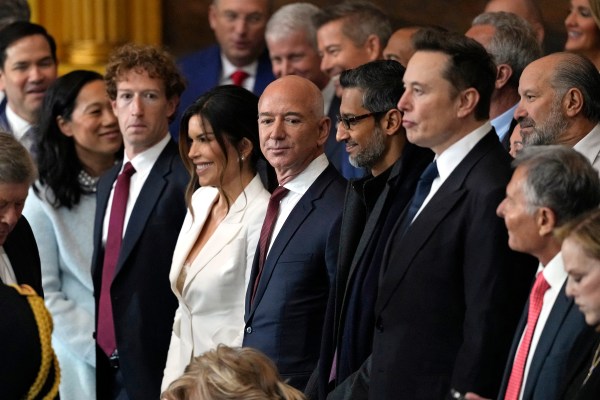In fairness, neo-Brandeisianism is not a new trend in antitrust theory. What has changed over time is what constitutes “bad.”
Teddy Roosevelt wasn’t quite the trust buster history remembers him as—William Howard Taft did more trust-busting than TR did. Also, TR liked some “combination”—i.e. bigness.
Yes, Roosevelt was fine with some trusts and wasn’t fine with others. In 1902, for example, he said stuff like this: “The great corporations which we have grown to speak of rather loosely as trusts are the creatures of the State, and the State not only has the right to control them, but it is duty bound to control them wherever the need of such control is shown.” In 1907, he told Congress that “every big corporation” should be accountable to “some sovereign strong enough to control its conduct”—before adding that he was “in no sense hostile to corporations.” In short, TR liked to bust up the trusts that he didn’t like and wanted to keep the ones he did. I remember reading somewhere that while the Roosevelt administration initiated the lawsuits against Standard Oil, Roosevelt himself wasn’t actually happy when the Supreme Court broke it up.
In the three-way race of 1912, everyone wanted to do something about the big banks. Taft wanted to double down on conventional antitrust enforcement. Teddy wanted to create federal agencies and commissions to regulate them from Washington. And Woodrow Wilson, following the advice of Louis Brandeis, wanted to fully pull them all apart through legislation. Brandeis thought the government should break up concentrations of economic power because bigness itself was bad. He was one of the intellectual architects of the FTC, established in 1914. Before Wilson put him on the Supreme Court in 1916, Brandeis even wrote a book, The Curse of Bigness.
Here’s the enduring problem: While the definition of bad changes, the definition of government power as good doesn’t. In one sense, that’s fine. We live in a democracy, and we should expect the party of government to think that government is good. But Democrats also always think that government is smarter than everybody else. Progressives—and now many on the New Right—have a blind spot in their bias against bigness: the bigness of the federal government.
Indeed, despite Brandeis’ claimed objections to bigness, during the Wilson administration, government and business got in bed together all over the place, particularly under the War Industries Board. But that was okay because, again, government is good. As I’ve argued for years like an obsessive weirdo who makes you feel unsafe at the public library, the early New Deal under the National Recovery Act was based on the War Industries Board. The New Dealers created “associations” of big businesses—aka cartels—that set prices, imposed production quotas, and crushed small businesses. The Brain Trusters thought “cooperation” between government and business was better than anarchic free-market competition.
But then, in the latter half of the New Deal, progressives zigged. Thurman Arnold (founding partner of Arnold & Porter, and quirky critic of capitalism and anti-capitalism) was appointed to run antitrust at the Department of Justice. And while he had some market-friendly problems with bigness, he still saw government as the solution to the problem. Government now needed to use its legal nightstick to foster the very competition it had discouraged, and eliminate the “bottlenecks” blocking the benefits of competition from reaching the consumer. “The four horsemen—fixed prices, low turnover, restricted production, and monopoly control—rode through our economy from factory to farm,” Arnold wrote. Bigness was now bad, but only when it was anti-competitive.
This view hung around largely uncontested until the 1960s, when Robert Bork had the crazy idea that if you’re going to get your knickers in a twist about the anti-consumer nature of anti-competitive bigness, you should actually look into whether consumers are actually harmed by bigness. It took a while for Bork and the University of Chicago crowd to win that argument in the 1980s, but not before the FTC apparently blocked a merger of La Choy and Chun King for fear of a “canned Chinese food monopoly.” (Though I searched for details on this and couldn’t really find them. It does appear that eventually fears of Sino-Supermarket Fare Hegemony were finally overcome, two decades later).
The consumer welfare standard pushed by Bork & Co. dominated until a few years ago, when Lina Khan, the progressive wunderkind head of the FTC, became famous for a 2017 Yale Law Review article insisting that Amazon should be busted up. Then Tim Wu published a book called The Curse of Bigness (The unoriginal title was presumably intentional). As Elizbeth Nolan Brown writes, “In contrast to the Chicago school, which thought scale could be evidence that a company provides an efficient service that customers value, the neo-Brandeisians saw popularity and size as signs a company is probably engaging in processes that suppress competition in a way that should be barred.”
Now, I’m on team Schumpeter when it comes to monopolies. Joseph Schumpeter, like Adam Smith before him, argued that monopolies were certainly possible, but without the help of government they’re destined to be temporary. I was reading something in an AOL chat room just the other day on this point. Or maybe it was a CompuServe message board?
Schumpeter’s insight was that you can’t just look at a monopoly at a moment in time and assume it will be permanent, because monopolies unprotected by government invite their own destruction—though unlike in Ghostbusters, they don’t choose its form. Monopolies are big. Big things are slow. Slow things get eaten by fast little things. Consider the Blade Runner Curse. Most of the evil corporate behemoths depicted in the movie either went out of business or were bought up by other businesses. As Kevin Williamson noted back in 2013:
Only 67 of the firms in the Fortune 500 in 1955 remained there by 2011. And the rate of corporate extinction is accelerating. Corporations are shorter-lived now: In the early 1960s, the average lifespan of a Fortune 500 company was about 75 years; today it is 15 years and declining.
Think about innovation in transportation. In 1900, 109,000 Americans were employed as carriage and harness makers, and in 1910, 238,000 people worked as blacksmiths. In 1920, 2.1 million were employed by the railroads. Today, fewer than a tenth of that work in railroads.
Anyway, my only real point here is that the Brandeis stans might be right about an existing problem. They might be wrong. But they always start with the assumption that government must act rather than wait for the market to work things out. Because, in my view, the love of using government power is their only consistent standard over the last century.







Please note that we at The Dispatch hold ourselves, our work, and our commenters to a higher standard than other places on the internet. We welcome comments that foster genuine debate or discussion—including comments critical of us or our work—but responses that include ad hominem attacks on fellow Dispatch members or are intended to stoke fear and anger may be moderated.
With your membership, you only have the ability to comment on The Morning Dispatch articles. Consider upgrading to join the conversation everywhere.